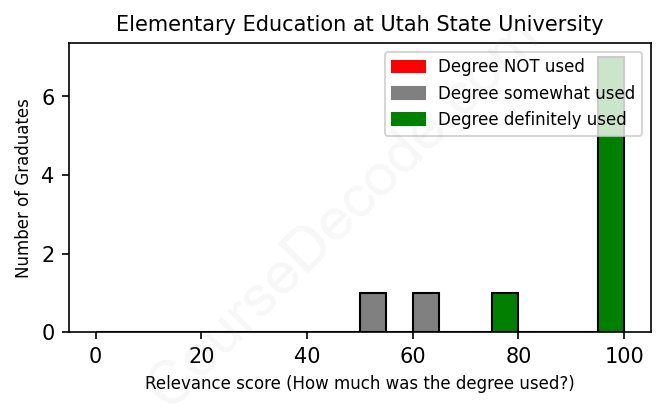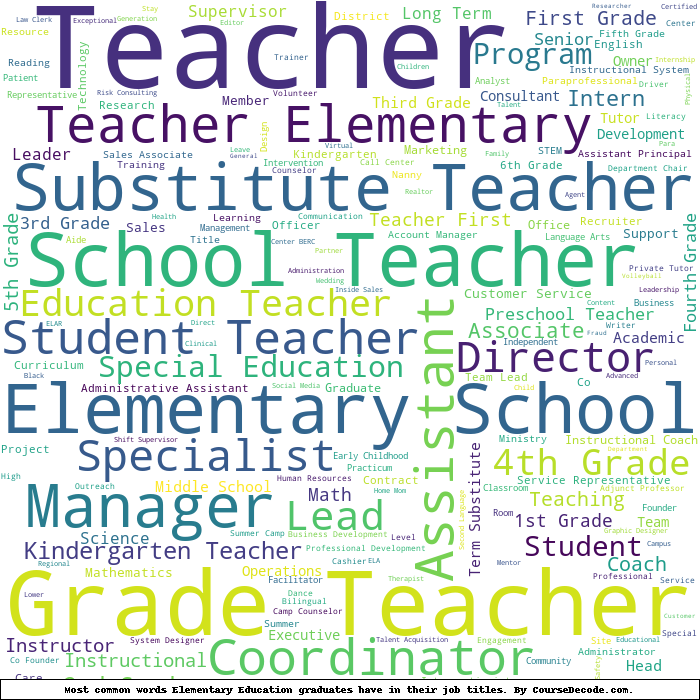
First, some facts. Of the Elementary Education graduates from Utah State University we've analyzed , here's how many have used (or NOT used) their degree in their career:

These are estimates based on AI analysis of 10 LinkedIn profiles (see below).
The verdict? Great! Overall, with an average relevance score of 89%, Elementary Education graduates from Utah State University have a substantially higher likelihood (+22%) of finding work in this field compared to the average graduate across all fields:
And for comparison, here's the chart for all profiles we've looked at across all degrees.
Also, after graduating, only 10% of these graduates have pursued further education other than another Bachelor's degree (such as a Masters degree or other), compared to the average across all profiles of 35%. This suggests a Bachelors degree is enough for most Elementary Education graduates, and it's normal to look for work straight after graduation.
See the details:
|
Relevance score: 100% We think this person has gone into a career highly relevant to their degree. We think this person has gone into a career highly relevant to their degree.
DEGREE INFOGraduated in 2012 from Utah State University with a Bachelor of Science (B.S.) in Elementary Education. No other secondary education since. JOB HISTORY SINCE GRADUATIONTeacher Woodruff Elementary Aug 2013 - Present ABOUTNo information provided. |
The top 10 most common jobs done by the graduates we've analyzed (ranked most common to least) are:
From looking at the LinkedIn profiles of graduates from Utah State University's Elementary Education program, it’s clear that many of them have taken on roles that are directly related to teaching and education, which is awesome. A good chunk of the graduates ended up as teachers in various school districts, with positions ranging from general classroom teachers to specific roles like reading coaches or English as a Second Language instructors. This shows that they’re putting their degrees to good use, working directly with elementary school students and applying the theories and methods they learned in college.
However, there are a few graduates whose jobs wander off the beaten path of elementary education. Positions like training coordinators, patient care managers, or even marketing managers don’t quite tap into the core competencies of a teaching degree. While these roles may require some transferable skills, they generally stray from the purpose of the Elementary Education curriculum. So, while most of these grads are thriving in relevant positions, a segment has taken up careers that don't directly relate to their studies, which might leave some wondering what the degree really set them up for. Overall, though, a lot of them are successfully making an impact in the educational field, which is pretty inspiring!
Here is a visual representation of the most common words in job titles for Elementary Education graduates (this is across all Elementary Education graduates we've analyzed, not just those who went to Utah State University):

It looks like graduates from Utah State University's Elementary Education program generally follow a pretty consistent career path. Most of them land their first jobs as teachers in local school districts shortly after graduation. For example, many alumni started their teaching careers in positions like 1st or 4th-grade teachers and have stuck with it for several years. It’s not uncommon to see teachers remaining at the same school or district for a significant amount of time, which shows that they’re committed to their roles and the communities they serve.
Five to ten years later, the trajectory still seems pretty focused on education, with many individuals advancing within the field. Some have taken on positions such as reading coaches or administrative roles within school districts. However, there are also a few who veered off into unrelated fields, like marketing or patient care management, but these seem to be the exception rather than the rule. Overall, if you’re considering this career path, it looks like there are good opportunities for growth in education, and many graduates stay connected to their roots in teaching, which is pretty inspiring!
Getting a Bachelor’s degree in Elementary Education at Utah State University, or really anywhere, has its ups and downs. It’s generally considered to be on the easier side compared to some other degree programs, mainly because it often prioritizes a lot of hands-on experience and practical learning, like student teaching and lesson planning. That said, it still requires a good chunk of reading, writing, and learning about child development and education theory, which can be a bit challenging if you’re not into that stuff. Overall, if you’re passionate about working with kids, you might find it pretty manageable, but like anything, it’s going to take time and effort to succeed. Just be ready to juggle your coursework with real classroom experiences!
Most commonly, in the LinkedIn profiles we've looked at, it takes people 3 years to finish a Bachelor degree in Elementary Education.
Looking at the job paths of these Elementary Education graduates from Utah State University, it seems like they’ve held some pretty standard teaching positions, which often don’t pay exceptionally well, especially in the early years of their careers. Most of them have continued in public school teaching roles, which can bring steady but not high salaries. A couple of them have moved into roles like Training Coordinator and Marketing Manager, which likely offer better pay, but those jobs aren't common for everyone in this field. Generally, it appears many have made a decent living, particularly if they’ve advanced into administrative or specialized roles, but a lot of them probably aren't rolling in it just from teaching alone. It’s a classic case of money in education—it's rewarding in many ways, but not always in your bank account, you know?
Here is a visual representation of the most common words seen in the "about" section of LinkedIn profiles who have a Bachelor degree in Elementary Education (this is across all Elementary Education graduates we've analyzed, not just those who went to Utah State University). This may or may not be useful:

Here are all colleges offering a Bachelor degree in Elementary Education (ordered by the average relevance score of their Elementary Education graduates, best to worst) where we have analyzed at least 10 of their graduates: